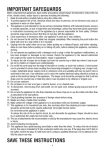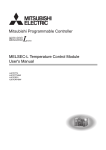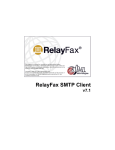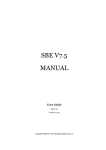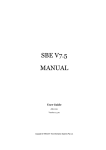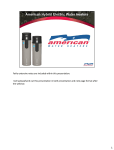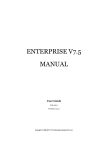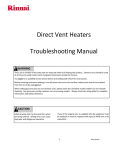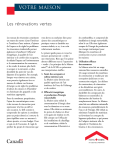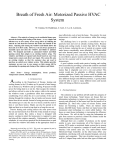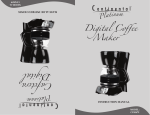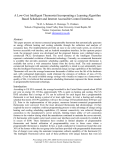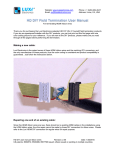Download PSU Climate Champions Guidance Document
Transcript
Market Center Building, Suite 128 1600 SW Fourth Avenue 503-725-8951 [email protected] PSU Climate Champions Guidance Document This document is designed to guide departments in completing the PSU Climate Champions best practices. Below you will find a detailed explanation of each conservation measure listed in the application (both required and optional), and in some cases, hyperlinks to more technical information or resources. Examples of what we will look for during verification are also listed. ENERGY CONSERVATION Required measures: Non-emergency indoor lights are shut off each night. Turn off all non-emergency lights each night. Educate staff on how to operate lighting controls (labeling switches is an effective tool), and set the expectation that the last person out will ensure all lights are turned off. Some buildings may not have manual switches but are instead controlled by a central system. In this case, confirm with Facilities and Planning that settings are optimized for your hours of operation. *In evaluating your office, signage or a written office policy will demonstrate compliance with this action. Employees are required to turn off computers each night. Employees turn off all computers each night, and/or computers are shut off automatically at a set time through OIT power management controls. It is unnecessary to leave computers on, as OIT is able to remotely wake up/shut down most computers and perform necessary updates. If computers must be left on overnight for system updates or remote access, OIT will inform your department. Otherwise, shut them down every day. This should be stressed to new employees as well. *In evaluating your office, reminder signage or a written office policy will demonstrate compliance with this action. Department participates in power management pilot through Office of Information Technology and Campus Sustainbility Office to enable sleep settings for computers and monitors. Contact [email protected] to initiate participation in the pilot. Power management settings save energy by putting the computer and monitor to sleep after a certain period of inactivity. When a computer is in a sleep state, it is like pausing a DVD player—the computer immediately stops what it’s doing, maintains all open documents and programs, and is ready to start again when you want to resume working, (just move the mouse or hit a key). *During evaluation, a CSO representative will check a random computer to see if settings are in place. Department has a shut down policy/checklist that outlines all electronics to be powered off each night. To ensure energy isn’t being wasted when the office is empty, develop a formal office shutdown procedure at the end of each day. The procedure should include: 1. A list of equipment to be shut down (having all peripheral electronics and your monitor connected to a power strip that is switched off at night can simplify this procedure). 2.Lights to be turned off. 3.Windows to be closed. 4.Doors to be closed and locked. **Office occupants will have varying needs depending on hours of work, etc. Be sure to discuss the policy with everyone in your office to ensure you have taken into account any special needs.** *In evaluating your office, signage or a written office policy will demonstrate compliance with this action. Choose at least two: Incandescent bulbs have been converted to compact fluorescent (CFL) bulbs in personal/ task lighting areas. Convert all incandescent bulbs used in personal desk or task lighting (including standard light bulbs, halogens and reflectors) inside your office to compact fluorescent bulbs or other low wattage solutions, such as light emitting diode (LED) bulbs. This measure excludes bulbs that are controlled by dimmer switches or bulbs being used for retail display. For reference, view a comparison of different bulb options at: http://www.energysavers.gov/your_home/lighting_daylighting/index.cfm/mytopic=12030 Department has performed an evaluation of the linear fluorescent lighting in the office, and if needed, has submitted a work order to convert T12 ballasts to more efficient T8 or T5 electronic ballasts. Lighting is responsible for 30 percent of the electric bill. If you implement energy-efficient practices that reduce your lighting usage by half, the University will see a cost reduction of 15 percent (especially important with our current reduced budget), as well as reduced use of energy resources and carbon emissions. • The numerical value in T12 and T8 designates their diameter in eighths of an inch. The T12 bulb is 12/8 of an inch (1 1/2 inches) and the T8 is 8/8 of an inch (1 inch). • Although both models are available, the T8 is gradually replacing the T12 for a number of reasons. T8 bulbs shine brighter than T12 bulbs of comparable length after any given period. T8 bulbs are more energy efficient than T12 bulbs. They produce a greater amount of light while using a smaller amount of energy. • While T12 and T8 bulbs work in the same type of socket, they use different ballasts. The T8 model uses an electrical ballast while the T12 uses a regular (magnetic) ballast. According to the Applications Team website, sponsored by the U.S. Department of Energy, lamps can be retrofitted with T8-friendly ballasts. • To perform a simple evaluation, measure the diameter of the bulbs around your office. If you have T12 bulbs, submit a work order with FAP (http://www.fap.pdx.edu/FF/FacilityMax.php) to retrofit your office with electronic ballasts that can accommodate T8 or T5 bulbs. Department sends, or will send, an e-mail to staff before holidays and breaks containing an energy-saving checklist. Example checklist: BEFORE YOU LEAVE FOR BREAK… • Shut windows tightly, including storm windows (extra window behind your regular one). • Winter: If you have control, turn thermostat down to 60 degrees. • Summer: If you have control, turn thermostat up to 80 degrees. • Shut curtains/lower your blinds for extra insulation. • Shut off power strips. • Unplug appliances not plugged into power strips (like microwaves, coffeepots, printers, faxes, and chargers). • Tightly turn off faucets, and report any leaks. • Water your plants. • Turn off the lights. • Have a safe and happy break! *During evaluation, a CSO representative will ask to see a drafted email that has been sent out to staff. Sleep mode is enabled on all copiers and all printers after five minutes or more of inactivity. Contact OIT for assistance: http://oit.pdx.edu/ or 503.725.HELP. Office policy requires Energy Star certification for new computers, electronics, and kitchen equipment. Implement an electronics purchasing policy that specifies Energy Star certification for all new computer, printer/copier, and kitchen equipment purchases. See the Energy Star website (http://www.energystar.gov) for more information, or contact [email protected] for information and assistance with PSU’s sustainable purchasing best practices. *In evaluating your office, a written office policy will demonstrate compliance with this action. Peripheral electronic equipment (monitors, speakers, scanners, label makers, desktop printers, radios, lamps, clocks, etc.) are all plugged into a power strip that is switched off each night. All of these peripheral electronics will add up to a lot of energy use if left on, and by connecting them all to one switch, you can greatly simplify your shut down process. This will reduce the likelihood that one or more devices are left on overnight or on the weekend. Experiment with power strip placement so that it can be located in a convenient place that doesn’t require you to get down on your hands and knees. Behind your monitor, rather than under your desk, can be a good location. Department has evaluated the office for motion sensor lighting or LED-lit exit signs, and submitted a work order to upgrade if needed. When occupancy sensors are installed in infrequently used areas, such as bathrooms, copy and storage rooms, and break rooms, we can conserve a lot of energy. These sensors turn off lighting after a period of inactivity, either through a motion or infrared detector. Submit a work order to install motion sensor lighting in a lower-use room in your department. (http:// www.fap.pdx.edu/FF/FacilityMax.php) Emergency Exit Signs: Examine your department’s exit signs to see if they use an incandescent or LED bulb. Submit a work order to replace all conventional incandescent bulbs in exit signs with LED bulbs, which use a fraction of the energy, last over ten years, and fit in the same sockets. Note: All exit signs manufactured on or after January 1, 2006 use LEDs or other low wattage bulbs to meet the Energy Star/ EPAct 2005 standard of 5 watts or less per face. TRANSPORTATION Required measures: Department provides all new hires with transportation options packet and information (http://www.transportation.pdx.edu/faculty/home) so that employees are educated about transportation programs, incentives, and resources. Utilize the transportation services website to provide this information to all new hires within your department. Contact Ian Stude for more information or with questions, x5-9015. **All PSU faculty and staff have access to a free Zip Car account. For personal trips, faculty or staff join free and get discounted weekday driving. (Sorry, student employees, graduate research assistants, and fellowships are not eligible for this discount.) For work-related driving, faculty or staff join free (and drive free!). Remind yourself and your staff of this alternative to driving your car to work. ** Virtual conferences and webinars offer increased flexibility and availability for staff and faculty, and not traveling can also save a lot of money and carbon emissions. *In evaluating your department, any new employees will be asked if they received the packet. Staff members are instructed to participate in annual commuter survey. Every other year, a survey is conducted to understand how faculty and staff commute to campus, where they commute from, and the motivating factors underlying mode choice. See http://transportation.pdx.edu/planning-sustainability for more information. Department is using trip journaling to track employee transportation modes. Trip journaling simply means keeping track of which transportation mode staff members use to get to work each day. This can take several forms. Some offices have a bulletin or white board with all employees’ names, and each day they mark what mode (bus, bike, walk, drive, or carpool) they used to get to work. Others departments may have a sign for each employee to hang on their door or cubicle noting the mode they chose that day. This can help to encourage an office culture of utilizing alternatives to driving alone to work. *In evaluating your department, a representative from the CSO will ask to see your method for tracking mode choices. Department staff are provided with current transportation options materials for review annually before the deadline for faculty/staff parking permit renewal. See http://www.transportation.pdx.edu/faculty, or contact Ian Stude at x5-9015 for more information or with questions. *In evaluating your department, all employees will be asked if they received the information. Choose at least three: Department is actively encouraging a reduction to the percentage of single occupancy vehicle (SOV) commute trips made by by staff. Reduction goals should be set at a 5 percent reduction per year until meeting or exceeding the university-wide goal of reducing SOV trips to less than 20 percent of all commutes (percentage determined by annual commuter survey). Setting goals for your work team can help to encourage more sustainable transportation choices, as can a dose of friendly competition. Practicing trip journaling will aid in keeping track of your progress. *In evaluating your department, a representative from the CSO will look for a written departmental policy. Department registers a “team” in the BTA’s annual Bike Commute Challenge. The BTA Bike Commute Challenge (http://bikecommutechallenge.com) takes place every September. All employees are encouraged to participate, even if they only ride one day that month. Departments can support this event by helping connect existing bike commuters with those who are curious about bike commuting. Contact Ian Stude at x5-9015 for more information or with questions. *In evaluating your department, a representative from the CSO will look for your department’s team in the Bike Commute Challenge team registry. Staff are offered the possibility of compressed work schedules (e.g. four 10-hour days, or nine 9-hour days). Offering flexible work schedules gives employees the opportunity to commute fewer days, and thereby reduce the carbon emissions associated with that travel. The decision to offer this option should be discussed with and approved by your supervisor. Staff are offered telecommuting options one or more days per week. Telecommuting, like flexible work schedules, gives employees the opportunity to commute fewer days, and thereby reduce the carbon emissions associated with that travel. The decision to offer this alternative should be discussed with and approved by your supervisor. Department purchases, maintains, and tracks usage of a fleet bicycle for staff use to run errands, attend meetings, or sample bicycle commuting (bike can be purchased and maintained through the PSU Bike Hub). Contact the PSU Bike Hub for more information about purchasing a bike. Visit http://www.pdx.edu/bikehub. Or, a used bike can easily be found and purchased for department use. WATER CONSERVATION Organization has completed two required measures: Sinks have been updated to have 0.5 gallons per minute (GPM) or lower faucet aerators in restrooms, and 1.5 GPM or lower faucet aerators in kitchens. Many of the sinks on campus do not yet meet these standards. In order to test the GPM of a sink in your department, follow these steps: 1. Hold a one-gallon container under a faucet or fixture and time how many seconds it takes to fill the container with the faucet opened all the way. Then divide 60 by the number of seconds it took to fill the container. For example, a fixture that filled the container in 30 seconds would be rated at 2 GPM. (The campus sustainability office can provide you with a one-gallon container if needed.) 2.Once the test is complete and you decide that a new aerator is needed, complete a work order at http://www.fap.pdx. edu/FFFacilityMax.php for installation. Department has designated one staff member to be a water monitor, responsible for receiving information on plumbing malfunctions and water wastage, and alerting FAP. Leaky faucet? Auto-flush toilet that flushes too often? FAP should be alerted of any malfunctions that can save resources, as these issues can waste a lot of water. Assign one person in the department to be the “go-to person” for reporting such issues. Staff should alert the water monitor of any malfunctions, and in turn the monitor should report to FAP. In June of 2010, the President’s Building Improvement team was launched, which has the similar function of facilitating communication between building users, FAP, and the CSO. The water monitor in your department would be an ideal representative to the President’s Building Improvement team. Contact [email protected] for more information on joining that team. PURCHASING AND WASTE PREVENTION Required measures: Printer/copy paper contains 50% or greater post-consumer recycled-content. The required recycled content minimum for state and local agencies is 30%, by State of Oregon Executive Order 98-07. (http://www.sos.state.or.us/archives/governors/Kitzhaber/web.../eo98-07.pdf) We think that a goal of 50% or greater is something PSU can achieve. First check to see if PSU has a contract in place for the products you are looking to purchase. PSU negotiates lower prices through contracts and many include environmentally preferable options and provisions for sustainable packaging, business practices, and delivery. • Lower prices on contract, compared to retail. • When ordering, look for the highest post-consumer recycled content. **In FY09, PSU purchased 816 cases of virgin copy paper (36% of total paper purchased). Switching to 100% postconsumer recycled content paper would SAVE the equivalent of: • 528 trees* • The CO2 equivalent of two cars per year * • 241,261 gallons of water * • Enough energy to power two homes per year Printers/copiers with duplex capabilities have double-sided printing as the default setting; If no duplex capability exists, department requires that any new printer will be duplexcapable. Contact OIT for assistance setting up default duplexing or for more information visit http://oit.pdx.edu or 503.725.HELP. This action is also suggested in the 2010 PSU Climate Action Plan. Office collects and reuses single-sided paper in printer or for scratch paper. The lid from an office paper packaging box can be easily converted into a second chance paper bin for collecting reusable onesided pages. Assign one printer drawer to be used for printing/copying on second chance paper, and be sure to communicate with everyone who uses the machine whenever changes are made. It is very important that pages with confidential information are NOT reused. Confidential information includes personal information of any kind. *Paper should also lie flat and not become wrinkled, otherwise it could jam the copier. Contact [email protected] for a sign to put over your collection bin or envelope. Before purchasing new supplies, the department checks with the PSU Reuse Room or FAP Surplus to see if used items are available. Reusing should come before buying new items whenever possible. Resource extraction, production, and disposal of items accounts for the majority of carbon emissions and other strains on our environment. The PSU Reuse Room is located in Cramer Hall room 180, and is open Mon.-Thurs. 10 a.m.-2 p.m.. See http://www.pdx. edu/sustainability/psu-reuses for more information. *In evaluating your department, a representative from the CSO will look for a written reminder or departmental policy. Department has an official paper reduction strategy and quarterly reporting system. Setting baselines is necessary if we want to show how much we are improving. What’s more, reducing paper use saves even more environmental and financial resources than simply switching to high post-consumer recycled-content paper (which is also recommended!). In 2008 the Campus sustainability office produced a copy paper report that helps to outline the benefits of the potential waste and cost-reduction scenarios associated with reducing paper use. To see the report, visit: http:// www.pdx.edu/sustainability/reports. Start tracking and documenting how much paper your department purchases and uses each quarter. Then, set a goal for reducing your paper use by a certain percentage (again, the copy paper report has examples, 30% is a good goal). Some ways to reduce paper use include: • Duplex print and copy whenever possible. • Do not print unless absolutely necessary. • Share documents electronically (via email, Google docs, Basecamp, etc.). • Allow for small edits to be written on documents, rather than re-printing every time small edits are made. • Reuse one-sided (second chance) pages. Once you begin tracking purchases and implementing reduction strategies, your department can then begin to compare quarterly paper use after the reduction strategies were implemented to see how much paper (and likely money) is being saved. *In evaluating your department, a representative from the CSO will ask to see your reporting system and a written statement of your department’s reduction goals. Department uses tap water (filtered or non) instead of bottled water or water coolers. Bottled water is a huge source of packaging waste, and the Portland Metro area has some of the best tap water in the country. By responsibly utilizing our local resource, we can help to prevent waste and discourage the depletion of other regions’ water resources. If your department has a problem with brown tap water that prevents people from drinking from the tap (as many of PSU’s older buildings do), you can look into having FAP install an in-sink water filter. Costs for installation range from $350 to $500 per sink, including labor. This is just an estimate of costs. Please contact Facilities and Planning for more information: 503-725-3738 (Monday through Friday, 8 a.m.-5 p.m.) or http://www.fap.pdx.edu/FF/FacilityMax.php to complete a work order. Department purchases remanufactured or refilled toner cartridges. Purchasing remanufactured toner cartridges—cartridges that have been used at least once and then disassembled, cleaned, and had worn parts replaced and toner refilled—can save buyers money while helping the environment. Typically, remanufactured cartridges save users from 30 to 50 percent off the price of new cartridges, or sometimes even more. Remanufacturing cartridges also keeps them out of landfills. Earlier remanufactured cartridges were poorly refilled with low quality and performance. There have been significant advancements in technology and testing since then. Pilot testing is always advised, as not all cartridges and printers are the same. Email [email protected] to set up a pilot test. Choose at least three: At least two other frequently purchased products contain 50% or greater post-consumer recycled content (such as paper towels, note pads, post-it notes, paper clips, pens, etc.). If you purchase something regularly, consider contracting for a greener alternative. If you don’t think you buy enough, consider joining forces with other departments or other public agencies. Email for [email protected] for more information. Also, ask your favorite vendor if they have a green catalog. If they don’t have a separate catalog, they may use symbols to identify more sustainable options. Ask your vendors what they can offer you. Most vendors stock to demand, so if we don’t ask, we don’t get. Influence your vendors to stock better alternatives! Look beyond the Logo “Green-wash” – verb: the act of misleading consumers regarding the environmental practices of a company or the environmental benefits of a product or service.” (2010 TerraChoice Environmental Marketing Inc.) “Green” marketing is popular, and many companies are jumping on the bandwagon. Many of them portray their products as having an environmental benefit, but buyer beware! Some companies may “certify” their own products—can you really trust that? Sometimes they put a “green” looking symbol on the packaging like a leaf, the earth, or the sun, but provide no information about what that means. The FTC has regulations regarding environmental labeling; however, there is little enforcement, so it’s up to us to make sure we know what we are getting. If something is advertised as “environmentally friendly,” then we need to know why and how that product meets that claim. Look for independent third-party certifications, which require testing and verification as a part of their certification process: • Green Seal (cleaning products, janitorial paper products, re-refined motor oil…) • EcoLogo (cleaners, construction materials, packaging, furniture…) • Forest Stewardship Council (wood products and paper) • GreenGuard (indoor air quality, furniture, bedding, flooring…) • And many more: check the Buy Green webpage for more information. There are a lot of new bioplastics labeled as “compostable” products being introduced. In order for something to be composted at PSU, it must be certified by the Cedar Grove composting facility. Cedar Grove currently only certifies food related items, so “compostable” pens are not acceptable. Compostable items are generally more expensive, and their real benefits are only realized when they are actually composted at the end of their life. Compostable materials breaking down in a landfill create methane, which is a greenhouse gas more potent than CO2. In addition, the agricultural methods used to produce bioplastics are petroleum intensive. It is much more preferable to buy durable goods less often, rather than buying something regularly that is designed to be thrown away. Promotional materials contain 50% or greater post-consumer recycled content AND display this percentage on the final product (such as brochures, mailers, and business cards). There are many print shops that offer recycled content papers and non-petroleum based inks. Make sure that the print shop uses paper with recycled content that matches the percentage printed on the document. There are several vendors in the Portland area that use greener materials for their promotional items, such as tote bags, t-shirts, pens, and pencils. If you are going to hand out promo items, make sure they are reusable, recyclable, and relevant (don’t give away something just for the sake of it, give away something useful). **Contact [email protected] for more information and suggestions.** Department provides durable plates, silverware, and cups in break room (no disposables). Garage sales and thrift stores are a great and affordable way to stock your break room with reusable (and reused!) items. Department provides durable plates, silverware, and cups at meetings/events, or sends an email prior to meeting asking staff to bring their own durable items. A simple reminder for meeting attendees to bring their own coffee mugs can go a long way to reducing waste. Guests then come prepared, rather than needing to use a disposable item. Department utilizes fax forwarding, fax-to-file, or print-to-mailbox features to save paper. These features are available on many newer printer/copiers, and allow documents to be stored or sent electronically. Faxto-file sends a pdf version of the fax to an email address or folder. Print-to-mailbox can reduce waste by requiring a user to access their mailbox on the printer before printing—if something was sent to the printer in error, the document doesn’t print until the user verifies that they want it to print. See the user manual of the machine or contact OIT for assistance: http://oit. pdx.edu or 503.725.HELP. RECYCLING & COMPOSTING Required measures: Department recycles all paper, bottles, and cans in properly labeled containers. All businesses in the Portland Metro Region are required to recycle their paper, bottles, and cans (glass, plastic and metal). • Paper, plastic, and metal are now collected in a co-mingled container, meaning the materials can be mixed and are separated later at a recycling facility. • Glass should be collected separately for recycling. PSU Recycles! can provide your department with bins and signs to improve your recycling system. Contact [email protected] or 5-4300 for more information and assistance. Recycling containers are located next to every trash can, and/or desk-side garbage containers have been replaced with central garbage collection area. Making recycling as convenient or more convenient than throwing something away is very important. Most offices do not need a garbage can for every person’s desk, and having a central garbage and recycling collection area can suffice. Or, you can replace desk-side garbage with recycling bins. In private areas, desk-side recycling and central garbage collection works well, and in public areas, recycling and garbage bins should always be paired so that convenience is not a factor in a recyclable item going to the landfill. Department collects and composts food scraps. As a participant of the Portland Composts Program, PSU has the opportunity to compost all kitchen food waste and foodsoiled paper. By composting a significant portion of the University’s food waste, PSU can potentially reduce its disposal fees, help the region meet its ambitious waste reduction goals, and work to improve the environment. Currently, there are compost roll-carts located in several locations. See http://ecowiki.pdx.edu/component/content/article/1-latestnews/1338-new-map-of-composting-locations.html for a map, or contact PSU Recycles! to obtain a copy: recycles@ pdx.edu or x5-4300. Tips for office composting: • Contact [email protected] for assistance obtaining a compost container. • Assign one or two people to be responsible for emptying on a weekly (or more frequent) basis. • Use a “who emptied the compost” sign-up sheet to keep track. Contact [email protected] for a pre-made sign. Department returns or recycles empty printer and toner cartridges. To have your empty printer/toner cartridges recycled, please place a work order by visiting http://www.fap.pdx.edu/FF/ FacilityMax.php and PSU Recycles! will collect them. *In evaluating your department, a representative from the CSO will ask to see your collection area for toner, or check with PSU Recycles. Employees receive education on how to properly use recycling system at employee orientation AND at least once per year. Contact PSU Recycles! at [email protected] or x5-4300 for assistance or to have a representative come and educate your new staff on the recycling system. Department ensures proper handling of the following items by completing a work order: batteries, electronics, and fluorescent light bulbs. Place a work order to Environmental Health and Safety by visiting http://www.fap.pdx.edu/FF/FacilityMax.php. Choose at least two: Department has special recycling collection for plastic clamshells, styrofoam, and/or plastic bags and film through PSU Recycles! Contact PSU Recycles! at [email protected] or x5-4300 to inquire about special collections for plastic clamshells or plastic bags and film. Special Instructions for Plastic Bag/Plastic Film Recycling: To effectively recycle plastic bags and plastic film, they must be placed into one large, clear, plastic bag and tied off at the top. Call PSU Recycles! if you would like a plastic bag recycling station in your area or would like to know where you can drop off your plastic bags or plastic film. *In evaluating your department, a representative from the CSO will ask to see your collection area for batteries, plastic film, or clamshells, or check with PSU Recycles! Department requests food waste composting at the events it hosts. Events held in Smith Student Union should automatically include compost collection service. For events outside of Smith, submit a work order request for event composting at http://www.fap.pdx.edu/FF/FacilityMax.php. Contact PSU Recycles! at [email protected] or x5-4300 with questions or for more information. Department ensures reuse of unneeded office equipment, office furniture, and office supplies by completing a work order for surplus or the PSU Reuse Room. Have surplus furniture, office items, or recycling to be picked up? Place a work order by visiting http://www.fap.pdx. edu/FF/FacilityMax.php. *In evaluating your department, a representative from the CSO will ask to see your collection area for toner, or check with FAP.










